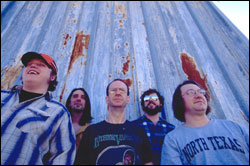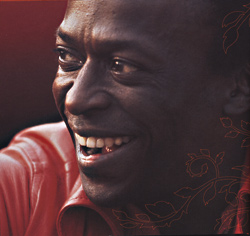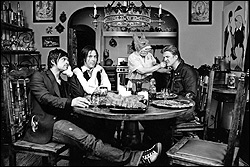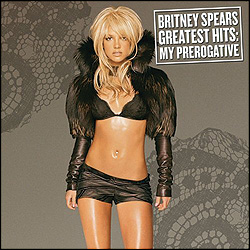The crass, utilitarian response to the Michael Jackson verdict that surfaced on front pages across America was oddly reassuring. Finally, a collective impulse to monitor the bottom line had trumped self-righteous prurience. Yesterday’s questions —”Did he or didn’t he?” or “How could he?” or even “How do you know when it’s bedtime at Michael Jackson’s house?”—were handily eclipsed by “Can this career be saved?” A celebrity trial that ended in neither conviction nor mass outrage disappointed the narrative instincts of our reportorial mythmakers, so those crafty buggers fell back on that old reliable: marketing.
Until then, the Jackson trial made me queasy. When watercooler pollsters and concerned talking heads request my diagnosis of a psychologically warped singer whose work I love, I just wonder what’s in it for me. After all, I’m no omniscient CNN expert, just an ‘umble critic, and though the mass-media compulsion to revel in a celebrity’s deterioration is a virus worth analyzing, in this case it’s also particularly contagious. Jackson brings out the worst in commentators, sending them careening into television’s two favored modes of discourse: snark and sanctimony. Jackson’s freakishness all but hand-delivers an engraved invitation to the former, any discussion of children in this culture practically assumes the latter, and, once the cycle starts, self-righteous indignation and glib potty-mouthing lend each other enough fuel to flame on in perpetuity.
But remember, the fame and eccentricity of this particular defendant aren’t the only reasons this case felt like it should be important. No, Michael Jackson is famous because he delivered some of the 1980s’ scariest music in some of that decade’s most reassuring performances. Despite its camp sheen, “Thriller” dredged up the adolescent fears of physical transformation that horror films sublimate, even while it acknowledged a coded fear of blackness. And on “Billie Jean,” a sole voice struggles to pass safely through a treacherous rhythm machine: drums stamp downward, a bass line rises and falls like a piston, and beneath the wide gaps in the keyboards a bottomless echo threatens to engulf the singer. The song’s a brilliant illustration of the warring emotions of terror and exhilaration that combine in the sex drive of a teenage boy, just one moment where Jackson has reveled in commingling seemingly opposite impulses. He didn’t just strike a balance between naïveté and sexuality, nervousness and grace, effeminacy and aggression—he demonstrated their interdependence.
Soon, though, Jackson’s bizarre public presence precluded any possibility of identifying with him; by 2001’s Invincible, he’d reduced the psychosexual dilemmas of Thriller to mere reflections of his personal grotesquerie. When Jackson cast himself as a monster on “Threatened” or bemoaned his lack of “Privacy,” the cries were his alone, starkly lacking the general resonance of “Thriller” or “Billie Jean.” Both his life and his music have given us the excuse to police the borders of adulthood and race and sexuality that he opened with Thriller. We could shrug: Of course a black performer with so adoring a white audience harbors ambitions of passing. Of course an effeminate adult with so pronounced a childlike side wants to fuck little boys—sure he’s “not guilty,” but that thin, shaky line between impropriety and pedophilia hardly renders his androgyny any more attractive. After all, just because you’re paranoid doesn’t mean they shouldn’t be out to get you.
What I find singularly depressing about this whole affair is that 20 years ago, Michael Jackson offered evidence that pop fans were smarter than the vulgar Marxists who frowned on such diversions. Thriller was pop achieving its most invigorating ideals—a jaw-dropping entertainment that doubled as a forum to collectively work though fears and desire at a public level. Yet even then Jackson teetered on the verge of delusions of megalomania. Even then it was evident he’d be the latest subject of our pathetic ritual dismemberment of celebrity—the indignant responses that have met each new revelation about Jackson’s personal life over the past two decades barely conceal the glee underneath. And once pop reeks so rankly of self-hatred, entertainment becomes mass pathology. When the overblown trial coverage prompted the expected chorus of tsk-tsking about bread and circuses, those puritanical media watchdogs were harder to debate.
So, yeah, I’m slightly heartened by the media interest in Michael Jackson’s possible commercial rehabilitation. At least this might, if tangentially, address the artistry that made us notice the guy to begin with. Might, if momentarily, extract him from the E! celebrity vacuum where stars are famous solely for their fame. Though received wisdom blames Jackson’s sales dip on bad PR or weak music, an open-minded listen to Invincible reveals that the former rarely leads to the latter. Throughout the album, the paranoid pop star struggling to maintain a larger-than-life image is often shouldered aside by the brilliant R&B performer stretching his abilities against the hardest beats of his career, if hardly the most contemporary.
Yet by occasionally removing himself from the pop moment, by favoring groove over hook, by placing commitment to rhythm over commitment to any imagined audience, Jackson, however tentatively and incompletely, regained his footing. A Michael Jackson who’s neither a punch line nor an icon, whose every vocal shading isn’t weighted with tabloid subtext, is almost impossible to conceive. If so, those brief flashes of impossibility on Invincible are just that much sadder.







